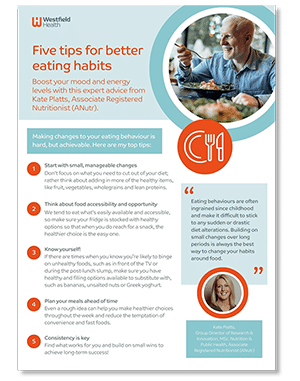Our food and nutrition choices plays a powerful role in shaping our energy levels, mood, and overall health. A healthy, balanced diet looks different for everyone, depending on age, lifestyle, and individual health needs. For people with medical conditions or special dietary requirements, personalised guidance from a registered dietitian is essential.
We’ve all heard the saying “you are what you eat”, from how whole grains give us steady energy, protein helps us stay focused and healthy fats keep our brains sharp. We’re diving into how different foods impact our body and the way that we feel.
The importance of good nutrition
According to the World Health Organisation (WHO), good nutrition strengthens the immune system, helping the body defend itself against illness. It also supports faster recovery from injuries or infections and lowers the risk of developing chronic conditions such as heart disease, diabetes, stroke, certain cancers, and osteoporosis.
A study found that 53% of people’s energy intake in the UK comes from ultra-processed food, which are linked to poor health, including to an increased risk of obesity, heart disease, cancer and early death. Beyond physical health, good nutrition is the foundation for overall wellbeing. It fuels our bodies with the energy to stay active, keeps our minds sharp, and even influences our mood. Eating a balanced diet rich in fruits, vegetables, whole grains, lean proteins and healthy fats can keep us healthier for longer as we age.
“You are what you eat” – what does this mean?
What goes on in your digestive system has a direct impact on how you think, feel, and function each day. Far beyond just fuelling your body, the food you eat shapes your gut health, influences your mood, and even affects your ability to cope with stress. For example, anti-inflammatory diets have been associated with reduced risk of depression.
It can be explained:
What you eat impacts your mental state by influencing the hormonal signals your gut sends to your brain. The “gut-brain axis” is a two-way communication system linking your gut to your central nervous system.
Kate Platts, Associate Registered Nutritionist (ANutr)
Inside the gut live trillions of bacteria, collectively called the gut microbiome. These microbes are incredibly important. They produce hormones and neurotransmitters, such as serotonin, that play a key role in regulating mood and supporting feelings of wellbeing.
When we eat a varied diet rich in fibre, fruits, and vegetables, we nurture a healthy gut environment, which helps our bodies produce these vital mood-regulating chemicals. On the other hand, diets high in processed foods and refined sugar can upset the balance of gut bacteria. This imbalance disrupts hormonal signalling between the gut and brain, which can negatively influence mood and energy levels.
How does food impact our energy levels?
People are often looking for energy-boosting foods and asking what we should be eating to avoid the mid-afternoon slump. Food is the body’s main source of fuel, and the types of foods we eat can make a big difference in how energised we feel. Whole foods like fruits, vegetables, whole grains, and lean proteins provide a steady release of energy, helping us stay focused and active throughout the day.
“To keep your energy levels steady throughout the day, it helps to choose foods that combine complex carbohydrates, protein, and healthy fats. For example, whole grains like oats release glucose slowly into the bloodstream, which supports concentration and avoids the peaks and dips you get from refined sugars.”
Kate Platts, Associate Registered Nutritionist (ANutr)
Some more examples include:
- Nuts and seeds. They offer protein and healthy fats, but also fibre. This helps your body slow digestion and helps you feel fuller for longer.
- Leafy greens, such as spinach and broccoli. They are rich in vitamins and minerals, particularly iron, which plays a vital role in your body’s ability to convert food into energy and combat tiredness.
- B vitamin-foods, such as wholegrain carbohydrates, eggs and chicken. They are vital for converting food into energy, supporting metabolism, and maintaining overall health.
Making small swaps without your diet to include some of the foods above could help boost your energy through the working day. This could be small steps such as opting for nuts instead of high-sugar snacks or switching to wholegrain rice and pasta alternatives.
Download our free resources on healthy eating habits
Eating habits can be difficult to change, so taking smaller, slower steps is the foundation for improving nutrition and wellbeing. Over time, these small shifts add up, creating lasting habits that support better energy, mood, and overall health without feeling overwhelming.
